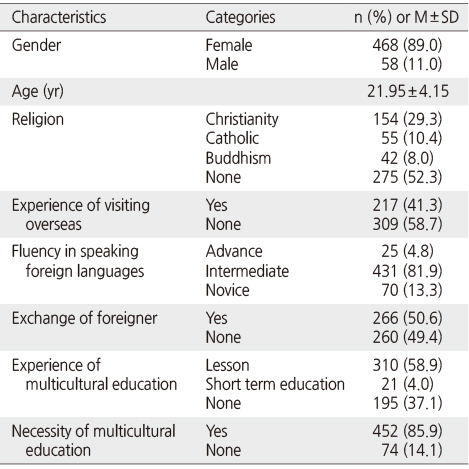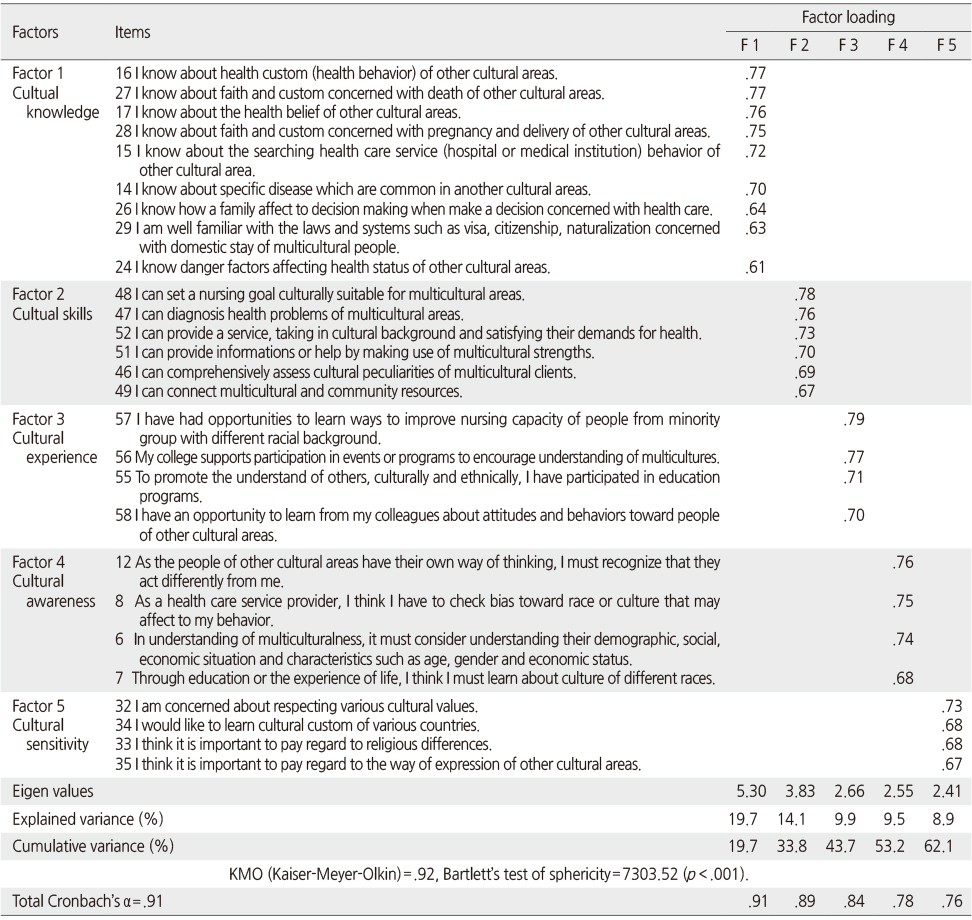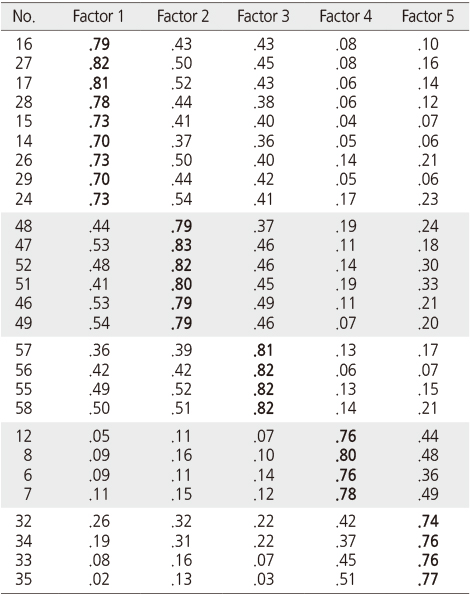Articles
- Page Path
- HOME > J Korean Acad Nurs > Volume 45(5); 2015 > Article
-
Original Article
- Development of a Cultural Competence Scale for Nursing Students
- Seok-Young Han, Hyang-In Cho Chung
-
Journal of Korean Academy of Nursing 2015;45(5):684-693.
DOI: https://doi.org/10.4040/jkan.2015.45.5.684
Published online: October 30, 2015
1Chosun Nursing College, Gwangju, Korea.
2College of Nursing, Chonnam National University, Gwangju, Korea.
- Address reprint requests to: Cho Chung, Hyang-In. College of Nursing, Chonnam National University, 160 Baekseo-ro, Dong-gu, Gwangju 61468, Korea. Tel: +82-62-530-4956, Fax: +82-62-220-4544, hchoch@hanmail.net
• Received: April 8, 2015 • Revised: April 22, 2015 • Accepted: June 18, 2015
© 2015 Korean Society of Nursing Science
This is an Open Access article distributed under the terms of the Creative Commons Attribution NoDerivs License. (http://creativecommons.org/licenses/by-nd/4.0/) If the original work is properly cited and retained without any modification or reproduction, it can be used and re-distributed in any format and medium.
Abstract
-
Purpose
- This methodological study was conducted to develop and test a cultural competence scale for nursing students.
-
Methods
- Based on the five constructs of cultural competency identified in the conceptual analysis of Suh, 76 items for the tool were derived initially. These items were reduced to 58 items after content validity tests (two times) by 6 multicultural experts. Data collected from 526 nursing students were utilized to test the validity and reliability of the preliminary tool. Item analysis, factor analysis, Pearson correlation coefficients, and Cronbach's alpha were used for the analysis.
-
Results
- Twenty-seven items were selected for the final scale, and categorized into 5 factors explaining 62.1% of the total variance. Cronbach's alpha was .91 and the reliability of the subscales ranged from .76 to .91. Criterion validity between the developed tool and empathy (r=.26, p <.001) was significant.
-
Conclusion
- The results show that this scale can provide scientific and empirical data when evaluating the effectiveness of school curriculums or multicultural empowerment programs regarding cultural competence of nursing students.
This manuscript is based on a part of the first author's doctoral dissertation from Chonnam National University.
- 1. Kang HY, Han SY. A study on social distance of nursing students toward minority groups in a metropolitan city. J Korean Public Health Nurs. 2013;27(1):166–178. Article
- 2. Korea Immigration Service. Korea immigration service statistics 2014 [Internet]. Gwacheon, Ministry of Justice. 2014;cited 2014 August 20. Available from: http://www.immigration.go.kr/HP/COM/bbs_003/ListShowData.do?strNbodCd=noti0096&strWrtNo=128&strAnsNo=A&strOrgGbnCd=104000&strRtnURL=IMM_6050&strAllOrgYn=N&strThisPage=1&strFilePath=imm/
- 3. Ministry of Public Administration and Security. Statistics on foreign residents by local governments in 2012 [Internet]. Seoul, Author. 2012;cited 2012 February 8. Available from: http://www.mospa.go.kr/frt/bbs/type001/commonSelectBoardArticle.do?bbsId=BBSMSTR_000000000014&nttId=35593
- 4. Oh WO. Factors influencing cultural sensitivity among nursing students. J Korean Acad Child Health Nurs. 2011;17(4):222–229. Article
- 5. Cross TL, Bazron BJ, Dennis KW, Isaacs MR. Towards a culturally competent system of care: A monograph on effective services for minority children who are severely emotionally disturbed. Washington, DC: CASSP Technical Assistance Center, Georgetown University Child Development Center; 1989.
- 6. Kim NK. Deliberative multiculturalism: A path to cultural rights and cultural survival. Korean Polit Sci Rev. 2005;39(1):87–107.
- 7. International Council of Nurses. Cultural and linguistic competence [Internet]. Geneva, CH, Author. 2007;cited 2007 August 20. Available from: http://www.icn.ch/images/stories/documents/publications/position_statements/B03_Cultural_Linguistic_Competence.pdf
- 8. Campinha-Bacote J. The process of cultural competence in the delivery of healthcare services: A model of care. J Transcult Nurs. 2002;13(3):181–184. ArticlePubMedPDF
- 9. Campinha-Bacote J. Becoming culturally competent in ethnic psychopharmacology. J Psychosoc Nurs Ment Health Serv. 2007;45(9):27–33.
- 10. Campinha-Bacote J. The process of cultural competence in the delivery of healthcare services: A model of care. J Transcult Nurs. 1999;13(3):181–184.ArticlePDF
- 11. Suh EE. The model of cultural competence through an evolutionary concept analysis. J Transcult Nurs. 2004;15(2):93–102. ArticlePubMedPDF
- 12. Leininger M. Culture care theory: A major contribution to advance transcultural nursing knowledge and practices. J Transcult Nurs. 2002;13(3):189–192. ArticlePubMedPDF
- 13. In: Lum D. editor. Culturally competent practice: A framework for understanding diverse groups and justice issues. 3rd ed. Belmont, CA: Thomson Brooks/Cole; 2007.
- 14. Song KB, Jang ED. Cultural competence and measurements in social work practice. J Hum Soc Sci Stud. 2010;29:40–69.
- 15. Choi SH, Kim SH, Lim MH. Developing cultural sensitivity scale. Pyeongtaek: Multicultural Family Center of Pyeongtaek University; 2008.
- 16. Yang SY, Lim HN, Lee JH. The study on relationship between cultural competency and empathy of nursing students. J Korean Acad Soc Nurs Educ. 2013;19(2):183–193. Article
- 17. Peek EH, Park CS. Effects of a multicultural education program on the cultural competence, empathy and self-efficacy of nursing students. J Korean Acad Nurs. 2013;43(5):690–696. ArticlePubMed
- 18. Chae DH. Development of a cultural competence scale for Korean nurses [dissertation]. Seoul, Yonsei University. 2013.
- 19. Munro BH. Statistical methods for health care research. 4th ed. Philadelphia, PA: Lippincott Williams & Wilkins; 2001.
- 20. Seo YS, Kwon YC. Factors influencing to the cultural competence in nursing students. J Digit Converg. 2014;12(6):415–423. Article
- 21. Jeon BS. The relationship between empathy and altruistic behavior [master's thesis]. Daejeon, Chungnam National University. 2003.
- 22. Polit DF, Beck CT, Owen SV. Is the CVI an acceptable indicator of content validity? Appraisal and recommendations. Res Nurs Health. 2007;30(4):459–467. ArticlePubMed
- 23. Kim HC. Statistical package for the social sciences 21.0 version. Seoul: Hakjisa Corp.; 2014.
- 24. Nho CR, Kim JH. Development of Korean cultural competency scale for human service workers. Korean J Soc Welf. 2011;63(2):207–231.Article
- 25. Suarez-Balcazar Y, Balcazar F, Taylor-Ritzler T, Portillo N, Rodakowski J, Garcí a-Ramí rez M, et al. Development and validation of cultural competence assessment instrument: A factorial analysis. J Rehabil Adm. 2011;77(1):4–13.
- 26. Caffrey RA, Neander W, Markle D, Stewart B. Improving the cultural competence of nursing students: Results of integrating cultural content in the curriculum and an international immersion experience. J Nurs Educ. 2005;44(5):234–240.ArticlePubMed
- 27. In: Lum D. editor. Culturally competent practice: A framework for understanding diverse groups and justice issues. 2nd ed. Pacific Grove, CA: Brooks/Cole; 2003.
- 28. Schim SM, Doorenbos AZ, Miller J, Benkert R. Development of a cultural competence assessment instrument. J Nurs Meas. 2003;11(1):29–40.ArticlePubMed
- 29. Cuevas MC. Cultural competence, cultural awareness and attitudes of social work students [master's thesis]. Austin, TX: The University of Texas at Austin; 2002.
- 30. D'Andrea M, Daniels J, Heck R. Evaluating the impact of multicultural counseling training. J Couns Dev. 1991;70(1):143–150. Article
REFERENCES
Figure & Data
REFERENCES
Citations
Citations to this article as recorded by 

- Clinical learning environment: Improving cultural competence in nursing students
Kuswantoro Rusca Putra, Alfrina Hany, Ratih Arum Vatmasari, Ike Nesdia Rahmawati, Ridhoyanti Hidayah, Kaista Bunga Disy Agse, Moch Denny Rosyid, Soniya Nailun Najah Zuhri
Journal of Education and Health Promotion.2025;[Epub] CrossRef - Teaching Christian values in a professional school using Good Samaritan model
Eun Ho Park, Mihyun Park
Journal of Beliefs & Values.2024; 45(4): 553. CrossRef - Enhancing cultural competency and empathy toward foreign patients for Korean nursing students through a simulation: A quasi-experimental study
Mijin Shin, Hyunjoo Na, Sujeong Kim
Nurse Education in Practice.2023; 69: 103615. CrossRef - Transcultural adaptation and validity of the nurse professional competence scale Korean version for graduating nursing students: An explanatory factor analysis
Su Jung Lee, Hyun‐Ju Seo, Kye Ha Kim, Jinhee Kim, Hyunlye Kim, Jeong‐Min Park
Nursing Open.2023; 10(2): 579. CrossRef - Factors Affecting Cultural Competence in a Sample of Nursing Students during the Prolonged COVID-19 Pandemic in Republic of Korea: A Cross-Sectional Study
Hyeran An, Juhyun Jin, Taehyun Kim
International Journal of Environmental Research and Public Health.2022; 19(22): 15181. CrossRef - Effects of a multicultural education program based on international students’ participation on intercultural communication competence and nursing professionalism
Kyung Jin Hong, Jungjin Han
The Journal of Korean Academic Society of Nursing Education.2022; 28(4): 389. CrossRef - Effect of compassion competence on cultural competence in student nurses: Mediating effect of professional nursing values
Jumi Lee, Won Hee Jun
Journal of Professional Nursing.2022; 41: 134. CrossRef - A Study on Global Nursing Practice Education Experience
Eun Sil Cho, Myoung Hee Seo, Soo Ok You, Ok Hee Ahn, Myeoung Hi Song
Journal of Korean Academy of Community Health Nursing.2021; 32(4): 485. CrossRef - The impact of cultural immersion international learning experiences on cultural competence of nursing students: A critical integrative review
Elise J. Matthews, Laurie Clune, Florence Luhanga, Reny Loewen
Journal of Professional Nursing.2021; 37(5): 875. CrossRef - A systematic review and meta‐analysis of the effects of global health competency improvement programs on nurses and nursing students
Jiwon Kang, Jeongeun Song, Wonjung Noh
Journal of Advanced Nursing.2020; 76(7): 1552. CrossRef - Influence of Cultural Competence on Nursing Professionalism of Nursing Students
Mijeong Park, Hana Yoo
Journal of Korean Academic Society of Nursing Education.2019; 25(1): 38. CrossRef - A Literature Review of the Studies on Cultural Competency of Nurses and Nursing Students in Korea
Min-A Kim, So-Eun Choi
Journal of Korean Academy of Community Health Nursing.2018; 29(4): 450. CrossRef - Effects of Critical Thinking Disposition and Empathy on Cultural Competency in Dental Hygiene Students
Ji-Min Hwang, Ji-Hyoung Han
Journal of Dental Hygiene Science.2018; 18(1): 24. CrossRef - Effects of cultural education and cultural experiences on the cultural competence among undergraduate nursing students
Jeong-Sil Choi, Ji-Soo Kim
Nurse Education in Practice.2018; 29: 159. CrossRef - Effects of a Cultural Competence Educational Program for Nursing Students
Hyang-In Cho Chung, Seok-Young Han, Seung-Hee Seo
Journal of Korean Academy of Nursing Administration.2017; 23(4): 406. CrossRef - Effects on Critical Thinking Disposition and Empathy on Cultural Competency in Nursing Students
Eun Ju Song, Ya Ki Yang, Sook Kyoung Park
Journal of Korean Academy of Psychiatric and Mental Health Nursing.2016; 25(4): 347. CrossRef - A Concept Analysis of Cultural Nursing Competence
Geum Hee Jeong, Hye-Sook Park, Kyung Won Kim, Young Hee Kim, Sun Hee Lee, Hyun-Kyoung Kim
Korean Journal of Women Health Nursing.2016; 22(2): 86. CrossRef - Relationship Between Self-Reflection, Critical Thinking Disposition, Muti Cultural Experience and Cultural Competence in nursing students
So-Young Pak
Journal of Digital Convergence.2016; 14(12): 345. CrossRef
- We recommend
- Related articles
-
- Development and Effectiveness of Progressive Simulation Education Program on Medication Safety for Nursing Students
- Development of a Reward Scale for Hospital Nurses
- Development of Nursing Clinical Judgment Scale
- Development of the Hospital Nurses’ Silence Behavior Scale
- Development of the Hybrid Clinical Practicum Environment Scale for Nursing Students
Development of a Cultural Competence Scale for Nursing Students
Development of a Cultural Competence Scale for Nursing Students
Demographic Characteristics of Participants (N=526)
Factor Analysis of the Cultural Competence Scale for Nursing Students (N=526)
Finding of Multi-trait/Multi-item Matrix Analysis (N=526)
Correlation Coefficients between Empathy and Cultural Competency (N=526)
Table 1
Demographic Characteristics of Participants (N=526)
Table 2
Factor Analysis of the Cultural Competence Scale for Nursing Students (N=526)
Table 3
Finding of Multi-trait/Multi-item Matrix Analysis (N=526)
Table 4
Correlation Coefficients between Empathy and Cultural Competency (N=526)
 KSNS
KSNS
 E-SUBMISSION
E-SUBMISSION




 Cite
Cite

